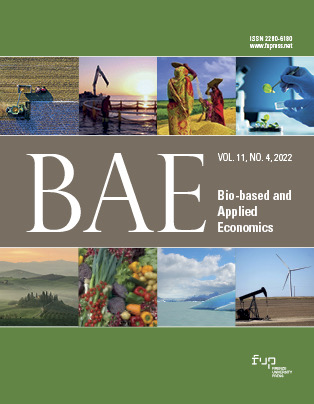Vulnerability and resilience to food and nutrition insecurity: A review of the literature towards a unified framework
Published 2023-05-03
Keywords
- vulnerability,
- resilience,
- food security,
- nutrition
How to Cite
Copyright (c) 2022 Pierluigi Montalbano, Donato Romano

This work is licensed under a Creative Commons Attribution 4.0 International License.
Abstract
Current approaches to measuring food and nutrition security (FNS) mainly consider past access to food, while assessing vulnerability and resilience to food insecurity requires a dynamic setting and sound predictive models, conditional to the entire set of food-related multiple-scale shocks and stresses as well as households’ characteristics. The aim of this work is twofold: i) to review the state of the relevant literature on the conceptualization and the empirical measurement of vulnerability and resilience to food insecurity; ii) to frame the main coordinates of a possible unifying framework aiming at improving ex-ante targeting of policy interventions and resilience-enhancing programs. Our argument is that clarifying the relationships existing between vulnerability and resilience provides a better understanding and a more comprehensive picture of food insecurity that includes higher-order conditional moments and non-linearities. Furthermore, adopting the proposed unified framework, one can derive FNS measures that are: scalable and aggregable into higher-level dimensions (scale axiom); inherently dynamic (time axiom); conditioned to various factors (access axiom); applicable to various measures of food and nutrition as dependent variables (outcomes axiom). Unfortunately, the proposed unified framework shows some limitations. First, estimating conditional moments is highly data-demanding, requiring high-quality and high-frequency micro-level panel data for all the relevant FNS dimensions, not mentioning the difficulty of measuring risks/shocks and their associated probabilities using short panel data. Hence, there is a general issue of applicability of the proposed approach to typically data-scarce environments such as developing contexts. Second, there is an inherent tradeoff between the proposed approach in-sample precision and out-of-sample predictive performance. This is key to implement effective early warning systems and foster resilience-building programs.






